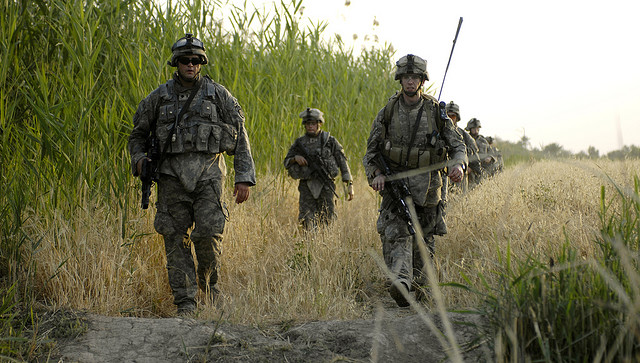
Soldiers on patrol in Yusifiyah, Iraq in 2007. Image by US Army on Flickr. Some rights reserved.
The UK benefits from an "admirably wide range of coverage" when it comes to war reporting, according to a new study from the Universities of Manchester, Liverpool and Leeds.
The research, which appears in a new book from Manchester University Press titled Pockets of Resistance, says the UK media provided balanced coverage of the Iraq invasion, including a "strongly anti-war element".
Focusing solely on a period of several weeks around the invasion phase in 2003, the university team surveyed the principal news programmes of the BBC, ITV, Channel 4 and Sky, and newspaper coverage in the Sun, Daily Mirror, Daily Mail, Independent, Guardian, Daily Telegraph and Times together with their Sunday editions.
"We spent a lot of time developing a framework to analyse the coverage," Piers Robinson, principal researcher, told Journalism.co.uk.
"We looked at a number of variables to assess questions of autonomy, subjectivity, bias and so on. We were looking at some traditional aspects of news coverage that communications researchers will look at, such as reliance upon sources, but also at more subtle elements such as the tone of reports, the language being used."
The results showed a wide range of coverage across the British press, and reporting, from Channel 4 in particular, that was "largely independent of the official government line".Channel 4 was "particularly notable for the extent to which it managed to stand aside from the coalition line during the invasion phase", according to Robinson: "Not all the time of course, but enough for us to warrant arguing that their coverage was fairly in accord with a negotiated stance as opposed to a supportive stance."
Sky News and ITV News, on the other hand, "tended to fall in line very much with the coalition narrative".
According to Robinson, the Telegraph, Times and Mail were "generally supportive, with most of the coverage falling in line with the coalition PR campaign"; whereas the Independent, the Guardian and the Mirror "were quite remarkable for the degree of criticism that they engaged in, even during the invasion phase, which according to the academic orthodoxy is quite a departure from the way a lot of communications scholars understand the media".
Certain issues, such as Iraqi civilian casualties, were found to bring out consistently critical reporting across the British press, even from predominantly pro-war newspapers.
Embedded journalism
Despite the relatively high degree of critical reporting in UK coverage, the findings suggest that more can be done to ensure mainstream news media gives voice to critics of the government line.
The practice of embedding journalists with army units was found to
lower the level of objectivity in reports. Figures show that 82 per cent
of coverage from Sky News' embedded reporters was supportive, compared
with 72 per cent supportive coverage from their non-embedded counterparts. But despite much being made of embedding, it is just
one of a range of factors, said Robinson.
"You've got an increase there, but it's not a vast shift. The indication of this and other studies is that it does have an effect, but journalists in a sense are already primed to cover conflicts in a particular way, due to news values but also to do with issues of patriotism and reliance on sources. It has an effect, but probably not a huge one in the grand scheme of war coverage."
The need to cover the "our boys in action" line had more of an effect on the nature of coverage than embedding, he added.
"Although we found impressive examples of media independence,
journalists need to think more critically about the extent to which they
allow the national perspective of 'our boys' to influence their war
reporting," said Robinson.
"The broad thrust of the argument we're making is that the patterns of wartime coverage are more complex and interesting than a lot of the traditional accounts, which tend to very critical and paint a very uniform picture of the way the media covers war. There's actually a lot more going on."
More on war reporting from Journalism.co.ukFree daily newsletter
If you like our news and feature articles, you can sign up to receive our free daily (Mon-Fri) email newsletter (mobile friendly).
Related articles
- Ukrainian journalists are at a breaking point. It is time to make a change
- Six career lessons in war and conflict reporting
- Unveiling the lessons of a war reporter's journey, with Andrea Backhaus
- Why journalists risk their lives for a story, with Dr Anthony Feinstein
- Kyiv Independent launches an English-speaking journalism school









